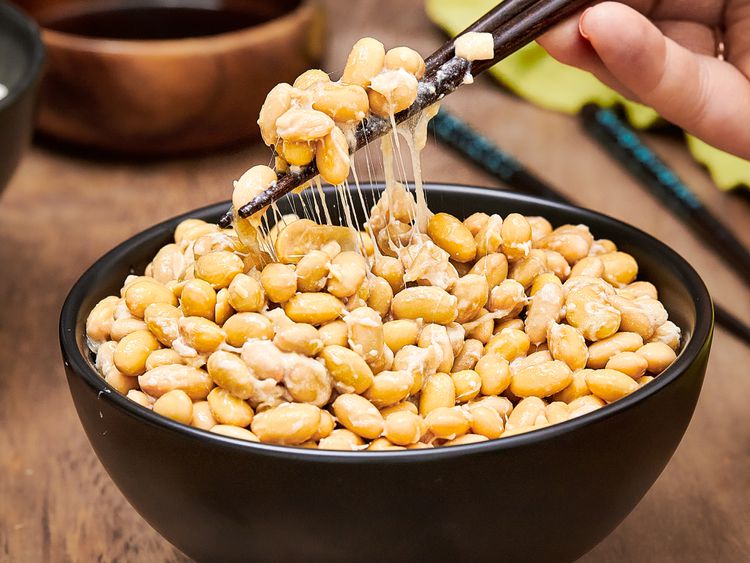What are the health benefits of natto?
Here are some of the main health benefits of natto, a traditional Japanese fermented soybean dish:
- Rich in Probiotics: Natto is an excellent source of beneficial gut bacteria due to the fermentation process. The probiotics in natto can improve digestion and gut health.
- High in Vitamin K2: Natto is one of the best dietary sources of vitamin K2, which plays an important role in bone and cardiovascular health.
- May Reduce Blood Clotting: Natto contains an enzyme called nattokinase that has been shown to help dissolve blood clots and improve circulation.
- Anti-Inflammatory Properties: The fermentation process creates compounds in natto that have potent anti-inflammatory effects, which can help reduce inflammation in the body.
- May Improve Cholesterol Levels: Studies suggest that the nattokinase and other components in natto may help lower LDL (“bad”) cholesterol and raise HDL (“good”) cholesterol.
- Provides Soy Isoflavones: Natto is a good source of isoflavones, plant compounds that have antioxidant and hormone-regulating effects that may benefit overall health.
Incorporating natto into the diet, especially for those at risk of cardiovascular disease or osteoporosis, can be a nutritious addition. The unique fermentation process gives natto different health properties compared to other soy products.
What are the health risks of natto?
Natto is a traditional Japanese food made from fermented soybeans. It is known for its strong flavor and sticky texture, and it is often consumed as a breakfast food in Japan. While natto is considered a nutritious food and is rich in protein, vitamins, and minerals, there are some potential health risks associated with its consumption, especially for certain individuals. Some of the potential health risks of natto include:
- Allergic reactions: Natto is made from soybeans, which are a common allergen. People who are allergic to soybeans may experience allergic reactions, such as itching, hives, swelling, or in severe cases, anaphylaxis, after consuming natto. It’s important for individuals with soybean allergies to avoid natto and other soy-based foods.
- Vitamin K content: Natto is high in vitamin K, which plays a role in blood clotting. While vitamin K is essential for health, consuming large amounts of vitamin K-rich foods like natto can interfere with the effects of anticoagulant medications (blood thinners) such as warfarin. People taking these medications should consume vitamin K-rich foods consistently and in moderation, and they should consult with their healthcare provider for guidance.
- Histamine content: Like other fermented foods, natto contains histamine, which can trigger allergic reactions in some individuals, especially those with histamine intolerance or sensitivity. Symptoms of histamine intolerance may include headaches, flushing, hives, or digestive issues.
- Sodium content: Some commercial varieties of natto may be high in sodium, which can contribute to high blood pressure and other health problems, especially if consumed in large amounts or if you have hypertension or other cardiovascular issues. It’s important to check the sodium content of natto and choose lower-sodium varieties when possible.
- Digestive issues: The strong flavor and sticky texture of natto can be off-putting to some people, and it may cause digestive discomfort or gas in individuals who are not accustomed to fermented foods. It’s best to introduce natto into your diet gradually to see how your body reacts.
Overall, natto can be a healthy addition to a balanced diet for most people, especially when consumed in moderation. However, individuals with soybean allergies, histamine intolerance, or certain health conditions should exercise caution and consult with a healthcare provider before adding natto to their diet.




